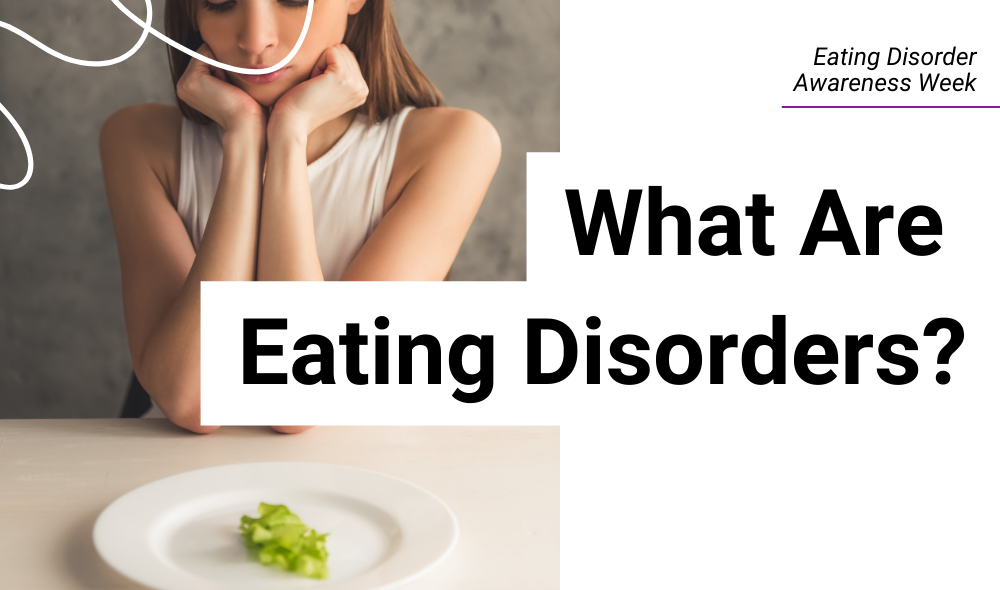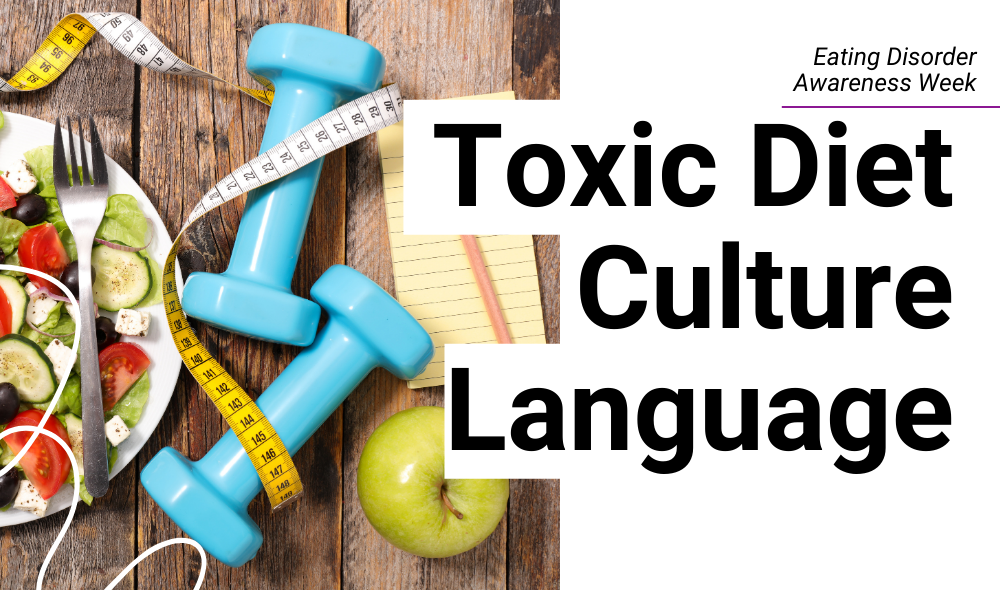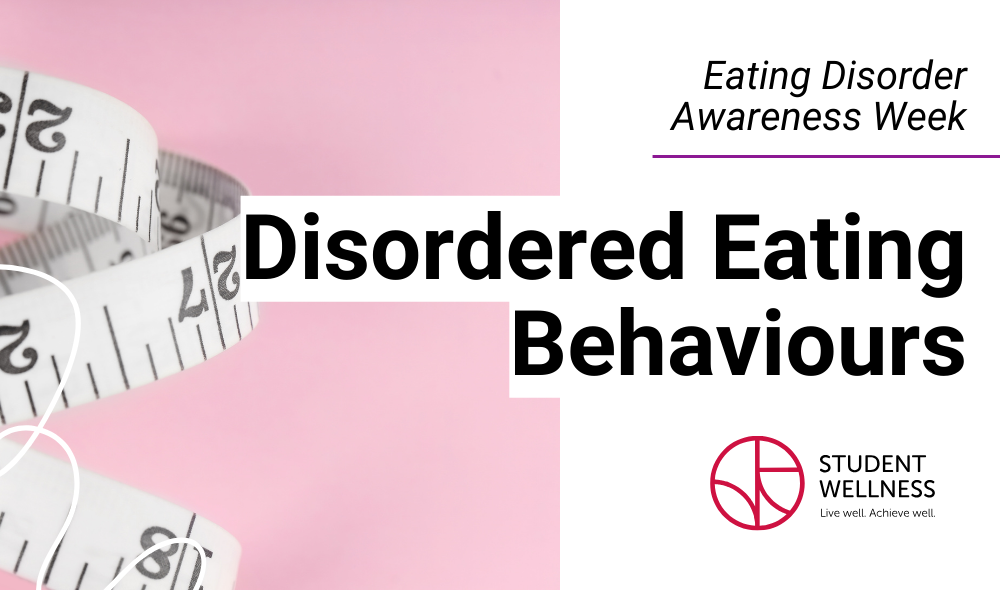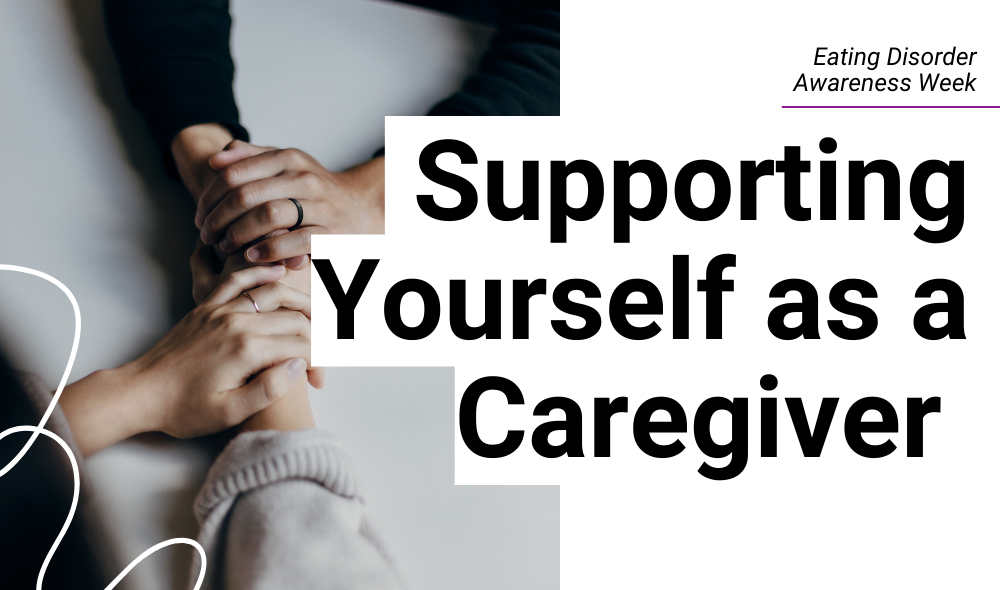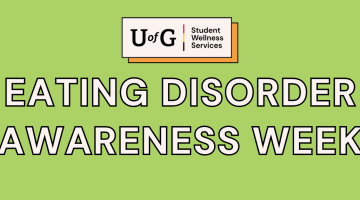Eating Disorder Awareness Week

February 1 to 7, 2025 is Eating Disorders Awareness Week. This week focuses on improving awareness of the impact of Eating Disorders, the dangerous stereotypes and myths, and the supports available for people living with or affected by them.
Jump to section:
- 2025 EDAW Events at the University of Guelph
- What Are Eating Disorders?
- Spotlight on: ARFID
- The Dangers of Calorie Tracking
- Toxic Diet Culture Language
- Disordered Eating Behaviours
- Supporting Yourself as a Caregiver
- Eating Disorder Resources in the Guelph Community
Eating Disorders affect people of all genders, sexual orientations, ages, socioeconomic class, abilities, races, and ethnic backgrounds. If you are a University of Guelph student and are concerned about eating disorders or disordered eating, Student Wellness Services can help. Contact us at 519-824-4120 x52131 to book a free appointment with Counselling Services, or connect with our Dietitian & Nutrition Services for 1 on 1 appointments and group nutrition sessions.
You can also reach out to the National Eating Disorders Information Centre (NEDIC) and access their Helpline and online chat 7 days a week. Hours vary, so go to nedic.ca for more information.
2025 EDAW Events at the University of Guelph
Mirrorless Monday
Join us in writing positive affirmations and promoting self-love to yourself and others.
The Waterloo-Wellington Eating Disorders Coalition presents: Faces of Recovery
Join us for a free panel discussion featuring individuals on the road to recovery from an eating disorder.
Cookie Decorating & Button Making
Join us in decorating cookies and creating your own buttons to promote self-image and destigmatize talking about eating disorders.
What Are Eating Disorders?
Eating disorders are not just about food. They are complex mental health conditions that affect how one sees food and self-image. As a result, eating habits that have a negative impact on physical and mental well-being develop.
Eating disorders are prevalent on our campus: 1 in every 13 undergraduate students at the University of Guelph has an eating disorder.
Becoming educated about eating disorders is important, so let's learn how the National Eating Disorders Information Centre (NEDIC) classifies 5 common types of eating disorders and their symptoms.
Anorexia Nervosa
It is a life-threatening mental illness characterized by behaviours that interfere with maintaining adequate weight.
Signs & Symptoms:
- Irritability, insomnia, and intense preoccupation with food, all of which can be directly related to insufficient nutrition
- Weight loss (or a lack of appropriate weight gain in children)
- Abdominal pain or non-specific gastrointestinal concerns
- Dizziness and/or fainting
- Feeling cold all the time
- Anaemia
- Social withdrawal
Bulimia Nervosa
It is a life-threatening mental illness characterized by periods of food restriction followed by binge eating, with recurrent compensating behaviours such as purging or restriction.
Signs & Symptoms:
- Weight change, including weight loss or weight gain
- Calluses or cuts on the hands and knuckles from purging
- Bloating, dehydration
- Purging, or evidence of purging behaviours like frequent trips to the washroom after meals
- Restricting food intake
- Guilt and anxiety surrounding food or eating
- Concern with body weight or shape
Binge Eating Disorder
It is a condition of psychological distress leading to the frequent consumption of large amounts of food and lack of control over what and how much they are eating.
Signs & Symptoms:
- Changes in body weight
- Dresses in layers or clothing that disguises one’s body shape even when not appropriate for the weather
- Evidence of binge eating, such as the disappearance of food or hoarding of food in secret
- Guilt and anxiety surrounding eating or food
Orthorexia
It is a condition in which the individual is overly obsessed with "clean eating" to the point that it damages their well-being.
Signs & Symptoms:
- Spending a lot of time thinking about food and meal prepping
- Being overly concerned about the origin and quality of food
- Avoiding eating foods made by others and going to social events involving food for fear of being unable to comply with diet
- Refusing to eat foods that are considered “unhealthy” (e.g. animal products, fats, sugar, food colouring, salt)
- Being obsessed with supplements
Spotlight on: Avoidant/Restrictive Food Intake Disorder (ARFID)
Avoidant restrictive food intake disorder (ARFID) is characterized by limited food preferences, avoidance of certain foods or food groups, and sensory sensitivities related to taste, texture, smell, or the appearance of food.
Individuals with ARFID may avoid or restrict food intake and variety because of:
- sensory sensitivities
- fear of adverse effects from eating (choking, vomiting)
- loss of interest in food
Signs and Symptoms:
- Lack of interest in food
- Sensory aversions
- Limited food preferences
- Anxiety around mealtime
- Challenges with food textures and smells
Types of ARFID
Avoidant
- Individuals avoid certain types of food based on sensory features, leading to a sensitivity or overstimulation reaction.
Aversive
- Individuals refuse food based on a fear of an adverse reaction. This type of ARFID evokes a fear of choking, nausea, vomiting, pain, and/or difficulty with swallowing, which forces the individual to avoid food altogether.
Restrictive
- Individuals may show signs of little to no interest in food. They could exhibit indicators of little to no appetite, completely forget to eat, or become very preoccupied during mealtimes.
Adult ARFID
- Common symptoms in adults may include selective or extremely picky eating, as well as texture, colour, or taste aversions related to food.
Breaking Stigma
ARFID is more than extreme picky eating - it’s a complex barrier to eating with both physical and emotional components. Unlike other eating disorders such as anorexia nervosa or bulimia nervosa, ARFID is not driven by concerns about weight or body image. Instead, it is primarily associated with an aversion to certain sensory aspects of food or a lack of interest in eating.
Ways to Support
- Respect Food Preferences
- Acknowledge and respect the indiviudals specific food preferences and limitations. Avoid pressuring them to try new foods or challenging textures.
- Create a Comfortable Eating Environment
- Foster a comfortable and relaxed atmosphere during meals. Minimize stressors like pressure to finish a plate or negative comments about the individuals eating habits.
Be Patient
Meals can be stressful for someone with ARFID. Be patient and understanding during meal times, avoiding pressure to eat certain foods.
Educate Yourself
Learn more about ARFID to gain a better understanding of the challenges individuals face.
Reach Out
Find out from the person what would be the most helpful ways to support them.
Eating Disorder Resources in the Guelph Community
The Dangers of Calorie Tracking
What are Calorie Tracking Apps?
Calorie-tracking apps work by using your weight to recommend a daily calorie intake. However, the mechanism the apps work on is over-simplified and fails to account for the unique body types, metabolism, and lifestyles of individual users. This can often create a severe discrepancy between the app’s recommended caloric intake and your body’s actual needs.
Why are they harmful?
- Calorie-tracking apps are external indicators.
- Instead of listening to our natural hunger cues, apps like these push us away from listening to our bodies.
- We eat not only for energy and nutrients but also for social purposes and pleasure. Calorie-counting apps reduce our food needs to solely energy purposes and take away from the enjoyment aspects of food.
- Energy needs are not static.
- The amount of food that feels good for you today may feel inadequate tomorrow.
- That does not mean that you're doing something wrong. Energy needs vary. It's important to listen to your hunger cues because they reflect your body's needs.
- They can lead to hyper-control.
- The hyper-fixation of food that often results from using calorie-tracking apps can serve as a catalyst for disordered eating behaviours.
- Many users report severe over-restriction, guilt, and anxiety associated with food when using these apps.
- They use inaccurate formulas.
- Calorie calculators use formulas designed to estimate basal metabolic needs, meaning the number of calories one needs to perform basic life-sustaining functions -- without considering body composition, diet history, medications, genetics, and medical history.
- Eating just your basal metabolic needs will shortchange you nutritionally and likely lead to a suppressed metabolism as your body tries to conserve energy.
Toxic Diet Culture Language
Diet culture influences how we perceive 'health'. Because we are often told that our bodies need to look a certain way to be 'healthy' and that foods are either 'good' or 'bad', many of us have developed guilt and anxiety related to food.
“Food is Fuel” Yes, food is energy -- it keeps your heart beating and brain active. But, food is so much more than fuel because our bodies are not machines. Food is a way to connect with family and friends, create memories, celebrate holidays and traditions, as well as relax and unwind. There are many reasons that we eat.
“I need a cleanse” You do not need to go on a restrictive juice cleanse, eliminate entire food groups, or buy detox supplements to cleanse your body. These are often unsustainable, unregulated, and expensive. Our bodies are naturally equipped with organs, like our kidneys, gut, and liver, that do all the detoxing our body needs.
“I binge-watched that TV show” The word binge is used so freely in conversation that binge eating disorder has become desensitized. For example, the term 'binge-watching' can be triggering and insensitive to some folks. Binge eating disorder is a mental illness, so we should be conscious of using 'binge' in casual conversation as it can minimize people's experiences.
“I need a cheat day” Using the word 'cheat day' perpetuates the 'good' and 'bad' food thinking of diet culture. Classifying foods in this way leads to guilt and shame around consuming 'bad' foods. If no foods are considered 'bad', then the power of a 'cheat day' is no longer there. Balanced eating entails consuming not only a wide variety of foods, but also holding a positive attitude towards food and hunger.
“I need to burn off that burger” Exercise is not a punishment for eating. Thinking of exercise as a punishment for something that you ate yesterday or drank over the weekend makes us think of food as a reward and fitness as punishment. It is much better to frame exercise as a celebration of what your body can do. Movement should be something that you enjoy.
Eating Disorder Resources in the Guelph Community
Disordered Eating Behaviours
Disordered eating behaviours and dieting are risk factors for the development of eating disorders. The consequences of disordered eating often include feelings of guilt, shame, or failure related to food and body image. The dangers of these behaviours are often overlooked. Let’s explore some of these harmful, yet normalized behaviours.
Skipping Meals
Skipping meals or extreme portion control can result in:
- Nutrient deficiency
- Increased risk of binge eating
- Mood changes
- Low energy levels
- Disruption of hunger and fullness signals
While occasional meal skipping may not have severe consequences for everyone, intentional meal avoidance can be indicative of disordered eating patterns.
Rigid Food Rituals
Rigid food rituals often involve strict rules around eating, which can lead to obsessive thoughts about food. A heightened focus on food can generate anxiety and distress.
Strict routines and rules about food can reinforce a black-and-white mindset about food, categorizing them as “good” or “bad”. This thinking can contribute to an unhealthy relationship with food.
Preoccupation with Body
A preoccupation with one’s body may reflect an unhealthy focus on weight, shape, and appearance.
Excessive concern with body weight and shape is a common characteristic of eating disorders. Individuals may engage in frequent weighing, body measurements, or checking their reflection in mirrors excessively.
Fear Foods
Fear foods refer to specific foods that individuals feel anxious or fearful about consuming. This emotional reaction is often disproportionate to the act of consuming the food itself. Fear foods can be associated with negative body image and a desire to control or change one’s body shape or weight.
Avoidance of Social Situations
Individuals at risk for disordered eating may fear judgment or scrutiny from others regarding their appearance, eating habits, or body size. This can lead to social anxiety.
Social situations often involve food. The prospect of facing these situations can be anxiety-inducing for individuals with disordered eating, leading to avoidance.
Supporting Yourself as a Caregiver
Why is Supporting Yourself as a Caregiver Important?
It can be difficult to be in a position of support for someone with an eating disorder. Whether you’re a parent, friend, or partner, knowing your loved one is dealing with an eating disorder can bring up a lot of upsetting and complicated emotions.
Self Care
As a caregiver, prioritizing your own self-care needs in addition to your loved ones can be difficult. Here are some ways you can focus on self-care...
- Spend time with loved ones
- Participate in activities you enjoy doing
- Journal - or write down how you’re feeling
- Create art
- Take a mental health day to rest and renew
- Hydrate and nourish your body with foods you enjoy
Setting Boundaries
Setting boundaries will look different depending on your caregiving role. For example, as a family member, this could include disclosing as much or as little information about the situation to extended family and friends. No matter what role you play, it is important to be clear and firm with your boundaries in order to leave space for your own needs.
Creating a Support System
Being a caregiver can feel isolating and exhausting and it is important to accept help when it is available. You don't need to or deserve to go through this alone. Creating a support system could look like:
- Asking friends/family is they can take on some of your workload
- Asking your employer for adjustments to the way you work (i.e., workload, ability to take emergency calls, etc.)
- Asking your professor for extensions to deadlines
- Consider seeking mental health care for yourself - therapy can be useful as it is a dedicated time to focus on your own needs and feelings.
- Connecting with a support group that specializes in eating disorders directed towards family, friends, and caregivers supporting a loved one.
Eating Disorder Resources in the Guelph Community:
- University of Guelph, Student Wellness Services
-
Dietitian Services: Free resources, workshops and support for students
-
Physician Services: Book an appointment to speak with a doctor on campus
-
Counselling Services: Offers several resources, including both individual and group counselling to support students as they work through personal challenges that affect their ability to succeed at school and in other areas of their lives.
-
Instagram for Tips all week: @wellness_uofg
-
The Body Project: A peer-led workshop that aims to promote positive body image, reduce body shaming, and encourage folks to accept themselves as they are. This workshop is offered virtually over 2 weeks (2 x 2 hour sessions). Students can register for upcoming sessions via Gryphlife.
-
- U of G Eating Disorder Awareness Society Instagram: @uogedawareness
- National Eating Disorders Information Centre: nedic.ca
- The Waterloo Wellington Eating Disorders Coalition: Engages in professional development, advocacy, community engagement, education, awareness, service enhancement, and training in the prevention and treatment of eating disorders. @wweatingdisorderscoalition
- But I Hate My Body: Cracking the Code on Body Acceptance: Are you thinking about the notion of body acceptance? Or perhaps someone in your life is urging you to consider body acceptance. Maybe you have heard the word body acceptance and thought to yourself, “Why in the world would I accept THIS body?”
- Sheena’s Place: sheenasplace.org
- National Initiative for Eating Disorders (NIED): nied.ca
- Families Empowered and Supporting Treatment of Eating Disorders (FEAST): feast-ed.org
- Waterloo-Wellington Family and Friends Support Group: cmhaww.ca/programs/services-for-eating-disorders/family-and-friends-education-and-support-group
